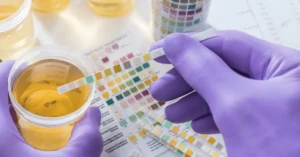Itchy genitals and recurring thrush can be some of the most distressing conditions to deal with. Although not necessarily a significant health threat, discomfort and embarrassment can cause enormous stress and get in the way of everyday life. Our GPs have come together to write this guide, which we hope will help you on your way back from this unpleasant condition.
Itchy genitals can be a distressing and uncomfortable experience for many individuals. The sensation can range from mild irritation to intense discomfort, impacting daily life and mental well-being. Understanding the common causes of genital itching, particularly recurring thrush, can help individuals seek appropriate treatment and regain comfort.
Common Causes of Itchy Genitals
1. Yeast Infections (Thrush):
One of the most common culprits of genital itching, particularly in women, is a yeast infection caused by an overgrowth of Candida, a type of fungus. Symptoms include intense itching, redness, swelling, and a thick, white discharge resembling cottage cheese. Although yeast infections are prevalent, recurrent episodes can be concerning.
2. Bacterial Vaginosis:
This condition occurs when there is an imbalance of bacteria in the vagina. Symptoms often include a fishy odour, especially after intercourse, along with itching and irritation. Bacterial vaginosis is not classified as a sexually transmitted infection but can increase the risk of STIs.
3. Sexually Transmitted Infections (STIs):
Various STIs, such as chlamydia, gonorrhoea, and herpes, can cause genital itching. Accompanying symptoms may include unusual discharge, pain during urination, and sores or blisters. It’s crucial to seek medical attention if you suspect an STI.
4. Contact Dermatitis:
Allergic reactions or irritations from soaps, lotions, laundry detergents, or even condoms can lead to itching. This condition is often accompanied by redness and swelling in the affected area.
5. Skin Conditions:
Conditions such as eczema, psoriasis, or lichen sclerosus may manifest symptoms of itching in the genital area. These chronic skin conditions require specific treatment and management strategies.
6. Poor Hygiene or Excessive Hygiene:
Inadequate cleaning can lead to the accumulation of sweat and bacteria. At the same time, excessive washing, especially with harsh soaps, can strip the skin of its natural oils, leading to irritation and itching.
7. Hormonal Changes:
Hormonal fluctuations, particularly during menstruation, pregnancy, or menopause, can affect vaginal pH and moisture levels, leading to dryness and itching.
8. Diabetes:
Uncontrolled diabetes can lead to an overgrowth of yeast, resulting in recurrent yeast infections and associated itching. Maintaining blood sugar levels is crucial in managing symptoms.
Focus on Recurring Thrush
Recurring thrush, defined as four or more yeast infections yearly, can be particularly frustrating.
1. Antibiotic Use: Antibiotics can disrupt the balance of good bacteria in the vagina, allowing yeast to flourish. If you need antibiotics, discuss with your doctor the potential impacts on your vaginal health.
2. Immunosuppression: Conditions that weaken the immune system, or certain medications (like corticosteroids), can make individuals more susceptible to yeast infections.
3. Diet: High-sugar diets can contribute to yeast overgrowth. Yeast thrives on sugar, so a diet rich in refined carbohydrates may exacerbate the issue.
4. Tight Clothing: Wearing tight, non-breathable fabrics can create a warm, moist environment conducive to yeast growth. If you go to the gym, make sure you change out of your gymwear as soon as possible. Opting for loose-fitting, breathable underwear made of cotton can help. Avoid g-strings.
5. Hormonal Changes: Fluctuations in hormones, particularly oestrogen, can impact the vaginal environment. Hormonal treatments or birth control methods may also play a role.
Tips for Managing & Preventing Recurring Thrush:
1. Seek Medical Advice: If you experience recurring thrush, consult a doctor. They may recommend antifungal medications or explore underlying health issues.
2. Maintain Good but not Excessive Hygiene: While it’s crucial to keep the genital area clean, avoid using harsh soaps or feminine hygiene products that could disrupt the natural balance of bacteria.
3. Wear Breathable Fabrics: Cotton underwear is ideal, as it allows for airflow and moisture absorption. Avoid synthetic materials that trap heat and moisture.
4. Dietary Changes: Reducing sugar intake can be beneficial. Incorporate more whole, unprocessed foods into your diet, and consider probiotics, which can help restore healthy vaginal flora. High-concentration probiotics can do wonders, in fact!
5. Limit Antibiotic Use: Only take antibiotics when necessary, and discuss alternatives with your doctor. If you must take them, consider using probiotics concurrently to help maintain bacterial balance! Also, increase your intake of prebiotics (found mainly in vegetables).
6. Manage Stress: Stress can impact overall health, including immune function. Engage in stress-reducing activities like exercise, meditation, or hobbies you enjoy.
7. Stay Hydrated: Drinking plenty of water can support overall health and keep the body functioning optimally, including the immune system, which is vital in preventing infections.
8. Practice Safe Sex: Using condoms can help prevent the transmission of STIs that may lead to genital itching. Discuss sexual health openly with partners and get regular check-ups.
9. Avoid Douching: Douching can disrupt the natural balance of bacteria in the vagina and lead to irritation. The vagina is self-cleaning, and regular washing with warm water is usually sufficient.
10. Monitor Medications: Discuss alternatives with a doctor if you are on medications that may contribute to yeast infections. This can include steroids or certain hormone therapies.
So when should you see a doctor?
While occasional itching may not always signify a serious issue, persistent symptoms warrant a visit to a doctor. Here are signs that you should seek medical help:
- Persistent Symptoms: If itching does not improve after self-care measures or continues to recur.
- Severe Discomfort: If the itching is intense enough to interfere with daily activities or sleep.
- Unusual Discharge: If accompanied by abnormal discharge with a strong odour or colour changes.
- Sores or Blisters: If you notice any sores, blisters, or other abnormalities in the genital area.
- Painful Intercourse or urination: If you experience pain during intercourse or urination.
- Fever or Other Symptoms: If you develop a fever, fatigue, chills, or other systemic symptoms.
Itchy genitals and recurring thrush are unpleasant and sometimes difficult to treat, as they require quite a few measures in tandem to heal. If you need us, we are here. Book online or call our team today.

















